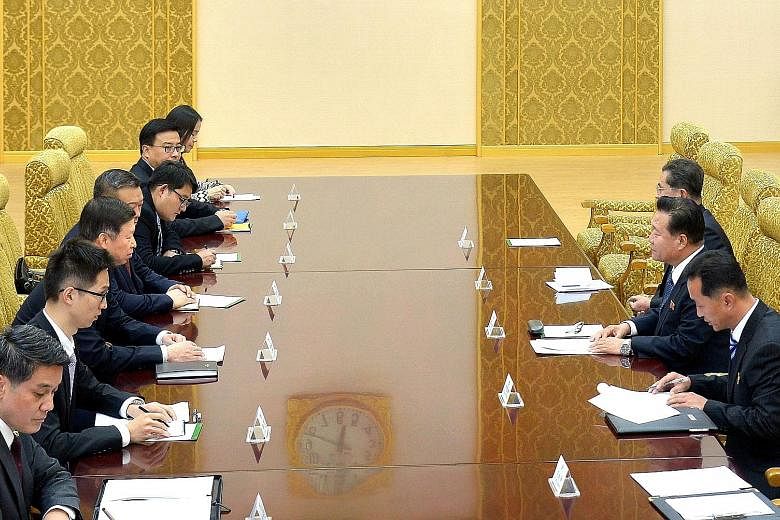The visit of China's special envoy Song Tao to Pyongyang at the weekend likely did little more than help stabilise frayed ties between the two allies and prevent further escalation of the North Korean nuclear crisis, said analysts.
But for now, the achievements would be enough for China, although there was some hope in capitals like Seoul for a breakthrough in the nuclear impasse.
Mr Song, who heads the international department of the Chinese Communist Party (CCP), visited North Korea for four days until Monday, to brief the ruling Workers' Party of Korea on the CCP's 19th national congress that took place last month. It was reported he discussed with North Korean officials matters of mutual concern - including the Korean peninsula situation - and analysts believed these included the North's nuclear and missile programmes.
The US, under President Donald Trump, has declared its policy of strategic patience with the North's nuclear and missile programmes is over and that all options, including a military one, are on the table.
The Trump administration has also pressured China to rein in the North. China, in turn, has agreed to heavier sanctions being imposed on the North, particularly after its sixth nuclear test in September.
Further sanctions will be imposed following the US move on Monday that designated North Korea a state sponsor of terror.
Mr Song would have conveyed a message to the North Koreans that they needed to proceed with care in order not to escalate the nuclear crisis, said Professor Su Hao of the China Foreign Affairs University.
"(China needs) to give North Korea a clear message it cannot take too drastic an action that could lead to military conflict," he said.
Prof Su believes Pyongyang would have heard the message. "Although in the past it did not listen to China, it needs to do so now."
The reason: If it chooses to cling to its own course, "this could threaten its survival", he said.
At the very least, Mr Song's message to Pyongyang would help to maintain the status quo, he said.
Prof Su expects Pyongyang to launch a missile or two in response to the US' latest move. But this would not go beyond what it had done before and will not lead to an escalation of tension, he added.
Mr Song's visit would also serve to stabilise bilateral ties, soured by China's hurtful sanctions on the North, said Associate Professor Li Mingjiang of the S. Rajaratnam School of International Studies.
The Chinese would want to reassure the North Koreans it will not abandon them nor want ties to turn hostile. Such hostilities would result in China not having any meaningful role in the nuclear issue and, worse, the possibility of the North making a deal with the US and alienating China, added Prof Li.

